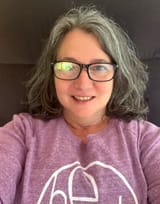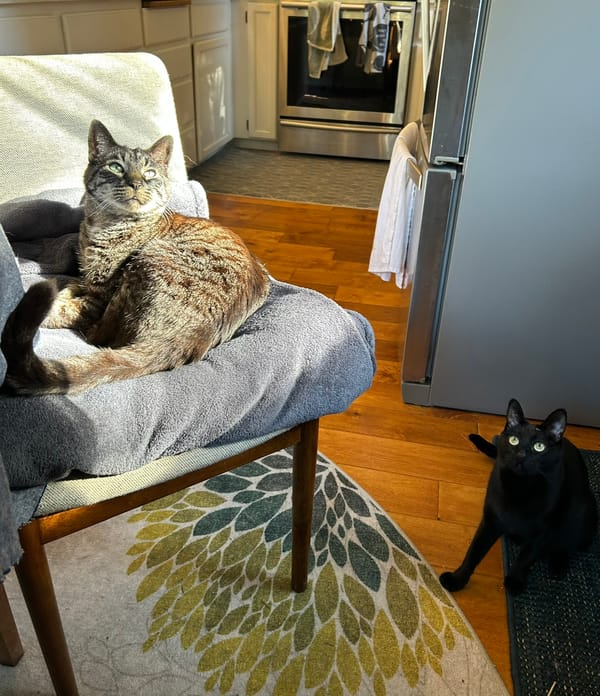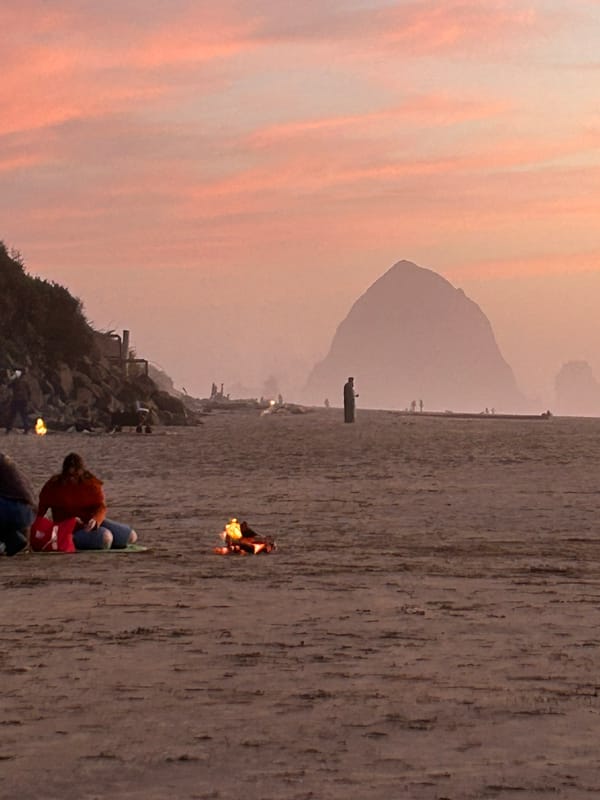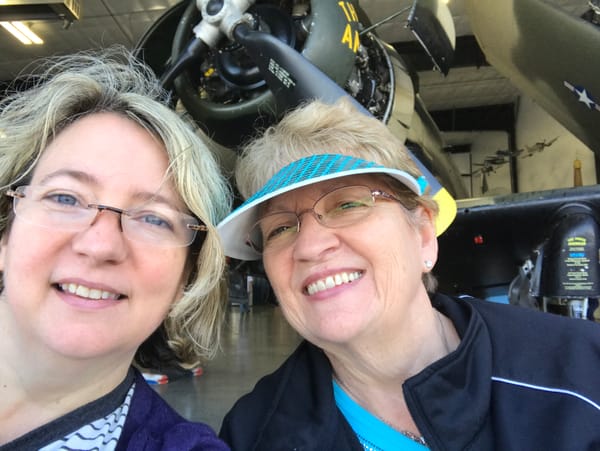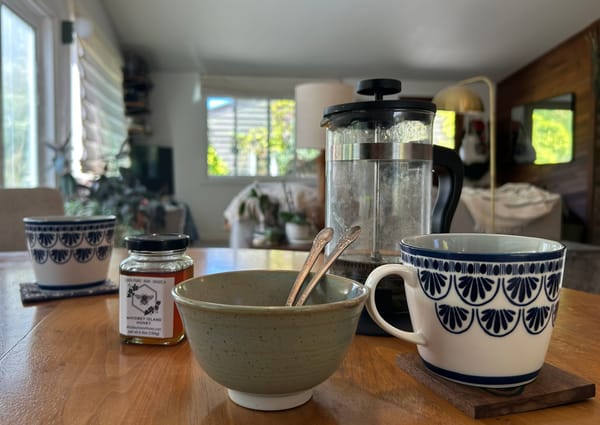Nine things that support letting go joyfully this year
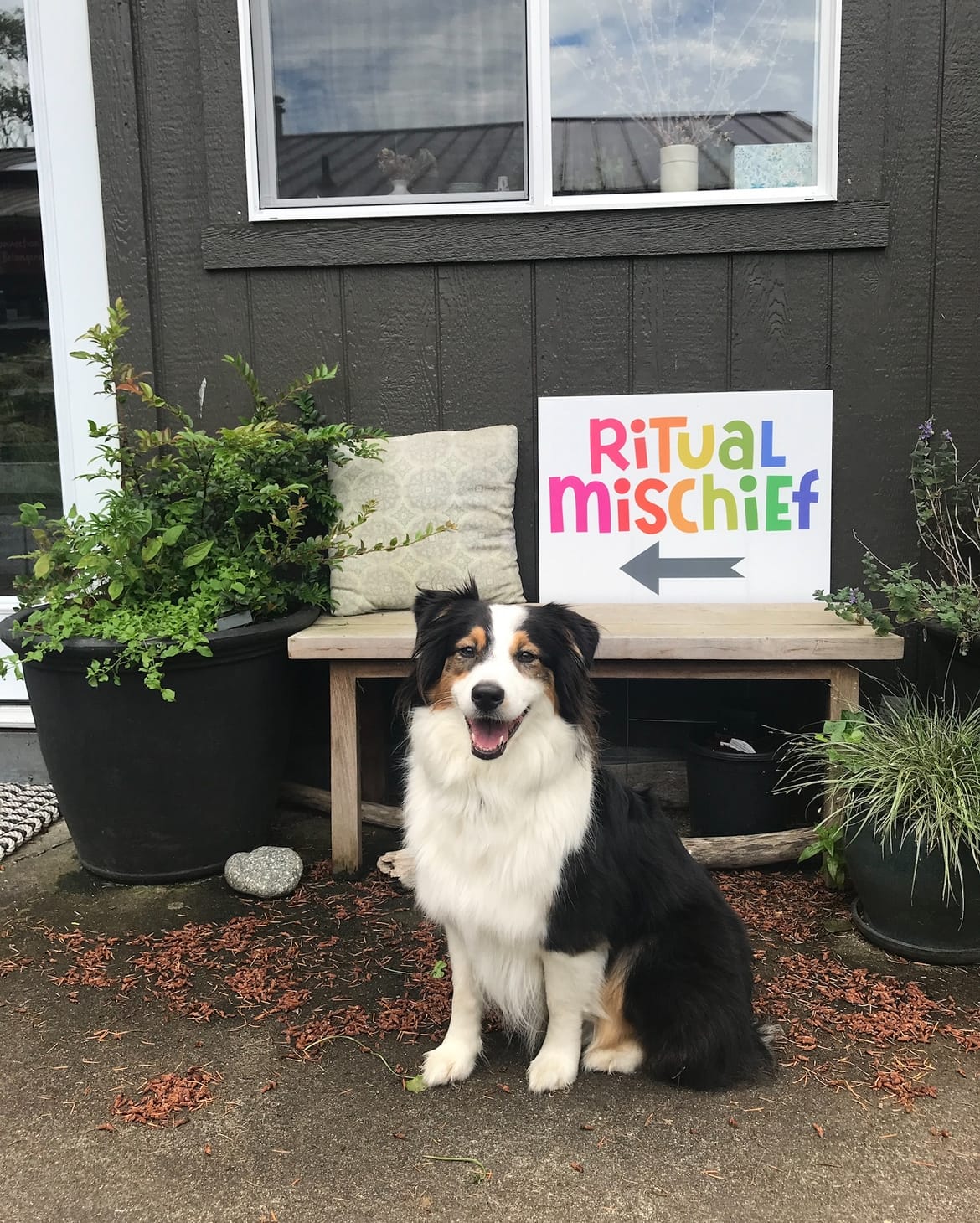
Last week, I told my small-but-deeply-loved writer's group– out loud– that I will be doubling down on joy, fun, and wonder in my writing this year. And, because they're connected– doubling down on joy, fun, wonder, and rest in my life and my family's and friends' lives this year, too. I don't have a choice in the matter this year. My body insists on this much-need response to the tremendous weight of the world almost everyone we know is holding now.
Joy. Fun. Wonder. Rest. And, letting go joyfully.
Here are nine things that surface joy, fun, rest, and wonder here this year and that also help us with the most difficult parts of letting go. Joy, fun, wonder, rest, and letting go joyfully. I'm insisting on all of these now. Wooing all. Summoning all. For all of us. Care to join me?
One: Softness and gentleness most of the time
Leaning on the land herself, on plants and animals, and on stillness. Leaning on shutting our eyes and listening to the sounds of the city-center neighborhood, or whole forest or park, or the bus or train or bike we're on. Maybe don't shut your eyes on the bike though. ;-) Leaning on the softest and gentlest of human beings, no matter what they look like on the outside. Gentleness, softness of heart, and generosity of spirit cannot be judged from the outside, they must be felt from within. Leaning on books and music and making art and growing or foraging food and cooking and baking. Leaning on very young and very old humans and on those differently abled than us in any way at all helps with joy, fun, wonder, rest, and letting go joyfully. All these beings, ways of being, and things, help.
Let them help. Receive help from the soft and the gentle to remember your softer and gentler, more fluid and flexible, self. Value your soft and gentle self and you'll automatically create softer, gentler groups and gatherings and organizations and families and online spaces too. We are everywhere. We always will be. Lean on us.
It's not soft, gentle, connected-to-each-other beings who are brittle, break, snap, and then settle for cruelty, abuse, violence, authoritarianism, and other horrors. Its beings taught to be, and trying to be, hard, tough, strong, rigid, and unyielding– entirely on their own.
Two: Seasons
May we never stop sharing the joys of different seasons and the mystery and joy of transitions between seasons. Noticing the changes that seasons bring: the simultaneous impermanence of things and the remarkable permanence of what matters most on earth. Noticing others loving something that you love about different seasons– literally no matter where they are on earth. Even noticing climate changes impacting the seasons, trees, plants, animals, insects, birds, soil, and people where we live. Even when seasonal noticing is painful (like here we've had to call August "wildfire season" or "smoke season" almost every year across the past 10 years), the seasons are still constant reminders that we earthlings have love of life, love of seasons and change, love of this place and planet, and an ability to adapt and change for the better in common. We have this in common. Flexibility is common!
Listen to the seasons. Let them help. Receive help from mother earth. She saves us here.
She
saves
us.
Three: Talking with friends and neighbors
Friendship saves us all. Let friends help. Especially if when you're saying goodbye and letting go of your former self, or a relationship, or someone you love(d)– for any reason– make sure to talk with another friend or two or three, ideally in person. Or, you know, talk with one of the 1 trillion different species on earth available for friendship too. If you think trees or wild birds don't care about how you feel, slow down. Listen more.
If you think you have only hard-hearted neighbors, two approaches that seem to work here: show up weeping when you're grieving or show up silently helping when they're grieving. See what happens. When we moved Mom into her memory care home seven years ago, I smiled while in the building with her, to help her, but I left the building weeping. My Dad's frail 85+ year old MAGA neighbor saw me weeping, crossed a lawn, and went out of his way to hug me in my grief. This was something my own dad, in his sorrow, hadn't thought to do and that none of the rest of our family was present to do either. I didn't change that MAGA man before he died, but he changed me. To this day, his hug keeps me focused on who I'm really mad at– dictators and billionaires who intentionally cause suffering on a massive scale to line their own pockets– while most of the rest of my country seems content to hate their poor and struggling neighbors.
Let friends help. Receive friendship. Let neighbors help too. This planet is still overflowing with friends, potential friends, and strangers who will one day be your friends or who will at least change you for the better even if they never become friends. Really, really.
Four: Curiosity about what matters most
What matters most to you? It doesn't have to be the same as others. Probably shouldn't be– that'd be dull. Knowing what matters most to us, and returning to this regularly, really helps.
Receive the help of reengaging with and trusting your innate curiosity. Of being curious enough to be aware of what matters most to you: both what matters most to you today, which can change with time, and what matters most to you always, which doesn't seem to change much, now that I've had almost 55 years to notice. Receive the help of being curious enough to know what matters most to those you live with, and encounter, day to day, too. Stubbornly demand the time you need to figure this out. If you don't, life will throw annoying, or difficult, or painful, thing after thing at you until you physically have to slow down, return to your body, and figure this out anyway.
Too many of us allow our fears about our neighbors to override our curiosity most days. Billionaires may have pumped billions into making monstrous things happen in the federal government in the U.S., for example. But even with all the money in the world, they couldn't have made this happen without a good chunk of us not caring about what matters most to ourselves and to each other. Choosing not to talk to each other, not to listen to our own intuition, not to listen with curiosity, and simply believing the worst about neighbors from a distance instead. Chronic fear, neglect, or abuse above curiosity, and chronic hate above love– these things don't work for life on earth. They never have.
May we be the last generation willing to accept that our own curiosity and needs don't deeply matter– to us, to our communities, and to the present and the future. We're working on that now. Some of us at home. Some of us at work. Some of us in our neighborhoods. Some of us online. And some of us standing shoulder to shoulder, unarmed, with beloved strangers and neighbors, in the street, on land we all deeply love regardless of where we came from. Week after week. Worried about what to say to others at a protest? Leading with curiosity and asking, "What brought you here today?" or "What matters most to you today?" works wonders. Where I walk this year, people often carry what matters most to them on hard-to-miss, handmade signs so that even people lacking curiosity and empathy can see it.
Five: Respecting love-centered, well-targeted fierceness
Loving, well-targeted fierceness is always beautiful. Always. When we feel isolated and alone, we can't always see or feel that. We can feel personally attacked instead.
Let people feel what they feel.
When you feel verbally attacked by something someone else is feeling– unless you are in eminent physical danger, which is an entirely different thing– the goal is to not attack outward first but to instead do whatever it takes for you to feel less isolated and alone. Take accountability for how you feel (isolated and alone), and re-center on feeling connected to others, or loved, or strong and kind or generous, before you speak. So that you have more than just one option: ATTACK THE HORRIBLE THREAT!!! So that you have lots of options to choose from. Life offers infinite options to choose from. When we are loving, connected beings, we know this. Love yourself and others enough to demand more options than just one.
This past month, here we saw loving fierceness in:
- The clergy who showed up in person this week to pray for the poor in the U.S. Capitol building– and who were arrested by a fascist government for doing so.
- Protests in the streets here, and around the world. Loving, working, generous-by-nature people are done with dictators intentionally starving people and billionaires competing to be trillionaires while others suffer, starve, and die needlessly.
- Our 80+ year old neighbors leading the protests. Nothing says "total bad ass" like realizing you may face arrest for peacefully protesting this year and figuring out how to demand that your walker be allowed to come with you to jail.
- Other countries learning from our mistakes here in the U.S. and pushing back, hard, against self-centered, greedy, cruel billionaires and the fascists who work for them. Both those currently running the U.S. federal government into the ground (and trying to run the American people into the ground with it), and those trying to rise to power elsewhere.
- Friends and family online. Even in spaces where we know we're being monitored and manipulated by algorithms and billionaires, we still bravely reach out, connect, and share what we're learning. Say "Fuck off" to brutal fascists. Amazing.
- Women and all gender-fluid and nonconforming folks defending each other and all of earth's daughters and fluid, nonconforming folk. There's been a noticeable uptick in love-centered fierceness and even real-life consequences reaching the manosphere influencers who crank out creepy violence-against-women-and-girls-and-all-non-cis-straight-heteronormative-silencing-angry-men, and their human-rights-are-bad and pro-rape bullshit to score political points or other status with other disconnected, small-minded, fear-centered, lonely bros. Love-centered cis straight men are joining this fight too, often hilariously and well, and making a difference. So lovely.
- Family and friends of murdered and maimed children, teens, elders, friends, aid workers, front-line folks, first responders, and other loved ones. People standing together across all old beliefs, faiths, ideologies, and state, regional, and country boundaries– distinctions and separations that no longer matter to those who've lost children, loved ones, or precious parts of them to ongoing violence and who want better for everyone on earth.
Six: Noticing and experiencing the important differences among 1) people experiencing difficult emotions publicly, 2) personal boundary setting, and 3) calling for civility and other tone policing of others
If you want to have a chance of repeatedly letting go joyfully, it's important to notice and experience these differences within yourself and others:
- Experiencing difficult emotions publicly and more openly sharing difficult emotions privately, among friends, too. This is collective and personal growth for humanity. This is us growing closer or realizing that we're far more connected that we imagined before or trusting each other more. This is a great thing, even when it doesn't feel great at first.
- Setting personal boundaries. This supports people being able to love themselves and others and not allowing relationships to devolve into chronic contempt, abuse, and cruelty. This, too, is personal and collective growth, a great thing for humanity. Even when it doesn't always feel great in the moment. Setting personal boundaries also sets us up to be aware enough about matters most to us, and others, and aware of our own power, so that we can keep growing and changing and recognize when we've moved past old fears or moved on from deepest grieving and can even let go of boundaries that we once very much needed but that we no longer need anymore.
- Calling for civility and other tone policing of others. Asking people who are scared, or grieving, or angry about being hurt in the moment– or for decades or generations– to change their tone is not the same thing as setting personal boundaries. At all. It's a control move. They must change their tone so that you feel more comfortable. In adults, it's often perpetuating abuse that we ourselves experienced in the past. A lot of us are unlearning how to do this right now. It's not an easy pattern to stop. And, here we avoid tone policing others whenever humanly possible.
All three of these things often don't feel great in the moment. And, the first two are usually great for both collective and personal growth. Not all learning and unlearning feels good. Growing pains aren't just a thing for teenagers: if you're living you never stop growing. Learning to allow ourselves and others to experience difficult emotions publicly is growth. Learning to set and respect personal boundaries and learning to hold people accountable when they cross your boundaries and walk all over you– and learning to notice and apologize when you do the same to others– this is also growth. In life, growth is usually good.
The third one– tone policing and calls for, or demanding, civility from people who are being actively harmed, silenced, or worse– is almost always a perpetuation of abuse from our pasts that we internalized. For example, believing that your silence equals your safety because being silent worked in childhood, when you didn't have any other options. If, in adulthood, we still demand silence, or change of tone to politeness, of suffering others, though, we're now foisting that abuse to others. This is often done unknowingly. And, when we demand that life herself shrink within people– be smaller, more silent, more polite– that's not life giving. It's not. That's life hating. That's a terrible place to ask people to start from or to build relationships from. Life hating stems from self-hating, which stems from abuse and not being able to stop abuse and having to be silent about injustice yourself at some point. Hating yourself and others while using civilized tones and hating others via suffering-causing and death-bringing policies, practices, and laws– yeah, that's all still hate. These days I'll take love-centered fierceness– life herself fighting for what matters most– any day of the week.
Seven: Pre-emptive blanket forgiveness
I know this sounds strange, especially right now, but hear me out. This is brand new to me this year. I'm just trying it out. I'm experimenting with leaning on absolutely everything I need, without apology, and this year sensitive-empath-who-listens-to-almost-the-whole-world needs this. I need this. You may not.
I decided this year that the only people I will be really, truly, unwaveringly mad at until things change for the better on earth are the handful of men left on earth who are 1) billionaires trying to be trillionaires because enough is never enough for them, 2) always angry and always blaming dictators and dictator-wannabes even when they win and win and win and trample, trample, trample all over others to "win," and 3) stuck WAY in the past as empathy-hating fascists who are trying to turn the U.S. into a full-blown fascist state that imagines and tries to make almost everyone else on earth tired, miserable, poor, a commodity (article of commerce), imprisoned, a slave, dead, or at seriously increased risk of suffering.
Is that not you? Congratulations! You have pre-emptive blanket forgiveness from me! That is, I love you and me, and I forgive both you and me, preemptively. Every flaw we have. Every wrong word we speak. Every moment we don't understand each other. Every blind spot we have. Every shortsightedness. Every need or habit we have that seems annoying or unnecessary or an obstacle in the way. Every moment of displaced anger where our anger about something or someone else lands on each other's heads because we're close, convenient, safe, and within reach.
Everyone else gets pre-emptive blanket forgiveness in 2025, including me. This doesn't mean I don't set boundaries, that I haven't let go (for now) of people draining my much-needed and dwindling energy, or that I haven't told strangers and friends both to back-the-fuck off. This means that even when I have set new boundaries, and fiercely said "Goodbye for now" to people or things I have to let go of right now to more fully center wonder, joy, fun, and rest, that I let go with love. I choose to let go with love. My choice. Mine. With acceptance that I'm not an all-seeing God and can't hold everyone simultaneously, as much as I'd like to try sometimes. And, I admit that my letting go or unfriending or boundary setting doesn't always feel loving to others. Especially when we're tired, or scared, or hurt and angry.
I let go with love for me and love for you. I accept that letting go is often necessary, even when it hurts beyond words. Even when one or both of us totally sucks at letting go right now. I'm ok with sucking sometimes. Ok with offering blanket pre-emptive forgiveness even though someone is certain to misunderstand this, because this is what our family needs this year to survive with joy, fun, rest, and wonder fully intact.
So far, pre-emptive blanket forgiveness is working like a charm most days. On the days it doesn't, I forgive myself that same day (blanket forgiveness), I write and create with anger and fire as needed to shift and move emotions through me, I get a better night's sleep as a result, and then I forgive everyone else within earshot (and some out of earshot) the next day, even when it's clear that we likely won't speak again for a while or ever (who knows?). Pre-emptive blanket forgiveness doesn't require our continued presence in each other's lives. Doesn't ask us to ignore much-needed personal boundaries. It does recognize that a powerful peace lives within each of us regardless of whatever else is happening on earth. We can choose that peace for ourselves when we need it. We hold that power. Lucky people experience this, witness this, are even taught this in their cultures or families. In my culture, it takes longer to figure this one out.
I also recognize that this is not entirely my lesson to teach, which is why I'm being long winded here. I am a student of pre-emptive blanket forgiveness. I learned this one from holding people in my heart who lost whole cities, whole family lines, all their schools and hospitals and homes and electricity and water and food and trees and land the past few years. People who witnessed tens of thousands of loved ones die horrific deaths, and hundreds of thousands of loved ones lose a limb or eye or multiple body parts, and people who watched millions of their countryfolk– all family in genocide– rounded up, many murdered quickly, and then the rest of them slowly starved to death. And intentionally made more vulnerable to diseases. And used as guinea pigs to test new high-tech weapons of torture and life eradication, developed in the U.S.
Eight: Recognizing and naming grief out loud
In cultures and families that avoid looking at, feeling, or talking about grieving very much, it can be difficult to recognize grief when you feel it and see it. Based on what we've experienced and witnessed here the past 10 years, here are some ways grief can show up, which I call:
- Howling at the moon. Sobbing, yelling, screaming, crying, blaming others, snapping at others, hiding from people you love, hiding from all people, turning on once-loved family members, mistrusting others, cutting people out of your life because you cannot fully rest or heal or function with them present, dropping to the floor in disbelief and horror, acting wildly out of character, being cruel, overreacting, doubling over with pain, growing tense and then rigid, physical pain showing up in new places in your body, depression, anxiety, numbing pain any way you can, disassociating, being angry at others for being happy, or being angry at yourself or others simply for being alive (survivor's guilt).
- Being grace. Silently showing up for others who are deeply grieving because you know how grief feels, making tea for each other, cooking for or dropping off food for those who don't have the energy or desire to feed themselves, taking care of other people's work or kids or pets so they can rest and recover, singing for/to/with each other, laughing together, dancing together, reminiscing, telling stories together, reconnecting, sending photos and videos to others to connect, decorating a room or doing hair or trimming fingernails or any act of kindness for someone who can't do it themselves, hugging or offering other kindnesses to a hurting or weeping stranger in public, giving people the benefit of the doubt, showing kindness to unkind people who don't "deserve" it because you know what grieving does to people and you know that you, too, have needed forgiveness and kindness from strangers, neighbors, and friends when you didn't "deserve" it either.
If I spend too much time alone or especially too much time online, I can feel like I'm drowning in grief this year. I've grown remarkably angry. I've snapped at Daniel for things I wouldn't normally snap about at all. I've had to explain my unusual behavior and actions to Daniel at least 4 times in the past few months– and say out loud to him that I am deeply grieving– because I'm holding a lot of grief for the country, and people in our community, and for family members and friends, and for people in genocide zones who feel like family, and for strangers in my own country being harmed by our government. Sometimes I'm grieving for the whole planet. Here, we now say out loud: "I am grieving" or "We are grieving." This helps us recognize that we are in pain, that we don't intend to take it out on each other, and it helps us become gentler with each other. These words summon grace.
Nine: Honoring faith and letting go together
This looks different from place to place but the lesson is the same. Here, we're not religious anymore. But we are spiritual, and we treat all beings with loving kindness and respect to the best of our ability as community. So, for us, this is honoring our deep, quiet, insistent, and unshakable faith in the power of stillness, listening, interconnectedness, nature, love, magic, and letting go together– even when we waver, question, and worry daily as individuals and as a country.
This is the final thing that's helping us hold on to joy, fun, wonder, and rest this year as we let go of what no longer serves us here. I've written about this before in my books, and on my Collective Self blog from my 30s and 40s. This one seems to follow me around, wherever I go, even as our stories change and perspectives broaden and deepen. Here's my latest favorite story, from this month, though it begins almost a year ago. This one is a happy-tears story. In a world that asks for instant gratification, try as I might, I always share a bit of backstory first and I always save my favorite story for the end. A special treat only for those who stay...
By June of 2024, I knew that we needed to let go of our beloved Ritual Mischief. I wanted to write again, float free again, full time if possible. This both broke my heart and gave me new energy and hope. We knew that Ritual Mischief was growing and needed a bigger family than ours– one with more human helpers/hands, more generations invested in her future, more time and energy to give her, and people with more local land to help deepen relationships. We didn't know who that family would be back then or that it would take us 10 months to find them. But we knew that we loved Ritual Mischief, and we loved this land and place and the people here, enough to be broken hearted every time another small business or small farm or land-centered wee shop like ours closed up and disappeared. We knew we had to at least try to try to find Ritual Mischief her next family, even if we failed at it.
And I knew more than that. Getting older has some huge upsides that are far too rarely talked about: one of them is trusting your own knowing, your own intuition, your own understanding of your place and unique powers in the tapestry of being. Hmm, apparently, I say tapestry of being now. Lord I'm old. ;-) Anyhow...
Last summer, I returned to writing to begin to claw my way out of the deep depression I'd sunk into watching our friends in Gaza and the West Bank face horrifying and bloody genocide beyond anything I'd ever witnessed or imagined possible. By writing daily into notebooks, I learned that I had to be a) far more actively involved in helping those in the most danger (which I immediately started doing), and b) far kinder to and gentler with myself to help heal my angry, isolated, broken heart– a heart wounded and stretched thin by lack of support from others in my life who weren't seeing what I was seeing every day and especially those in my government telling me I wasn't actually seeing what I absolutely was seeing daily (this part took far more time). More than a year before this latest presidential election that has far more people completely freaking out today, thanks to our beloved friends in the West Bank and Gaza, I was already first-hand witnessing the U.S. government's turn toward fascism. Under the "good" guy I'd voted for to save us from the "bad" guy. I was heartbroken. Full of rage. Feeling utterly powerless.
And, I also instinctively knew that only our most wide-open, loving, connected-to-life hearts would draw the right hearts, the right family, our way– to take over Ritual Mischief from us. We had to get back to that. Back to us. I had to get back to me. It took us almost a whole year, and a lot of trouble, and a lot of help, to get there.
It took learning from the non-stop love pouring forth from friends living at the dead center of genocide zones. Watching young people dance and elders smile out at the sea and land they all love– knowing they would all die soon. And, here at home it took making new friends on Whidbey who cared about stopping genocide as much as I did, too. It took me hiring the world's best helper for Ritual Mischief– and me learning that I really don't want to be a boss of anyone, ever, even of the world's best helper. It took Daniel's health scares that took our family 10 doctors and 5 full months to recover from together. It took using the full force of my herbalism skills and my whole self to help my dad survive his severe bronchitis– slow, patient, intricate skills needed by my own family that aren't available if I allow Ritual Mischief to stretch me too thin. It took recognizing that my Mom may have entered her last year on earth, in this body. It took noticing that my sister and niece could maybe use, or would at least like, more of my time. It took standing shoulder to shoulder at protests this spring– with beloved neighbors and with people I once foolishly imagined might be enemies– and feeling solidarity with the vast majority of humanity again, thanks to growing local and global protests.
All of that is what it took to return me to me. To once again have a kind enough, open enough, large enough heart to be able to draw the next perfect family for Ritual Mischief. And we did it. We drew the powerful, wise, sweet, and sassy 9-year-old kid who told her parents: "Don't come back home from your meeting until we own Ritual Mischief!!!"
That was the passion I had for Ritual Mischief when I shifted away from writing and toward herbalism back in 2018. That is the passion I have for writing and spending more time with extended family and friends today.
"Don't come back home from your meeting until we own Ritual Mischief!!!"
Love-centered fierceness, welcome. I am so glad you are here!
Those words were pure magic for me. Full of care. Hearing this love and this passion echoed so clearly back to me, in her words, wasn't just me hearing her words. I was hearing my own words, my own heart, from her. And I was hearing the voice of Ritual Mischief herself. Hearing her finding her most loving, just-right, next place in the world, as I now find mine again, too. Here.
We do get to let go joyfully in this life. Together.
Wow.
Wow.
Conclusion
How do we let go of things clearly not serving anyone at all? And how do we let go of them for good?
Here, it's by letting go joyfully and together as often as possible. Being present enough to notice that endings are new beginnings, too. It can mean feeling connected to people down the street and also to people around the world being hurt by the same things we're being hurt by. Sometimes, it means having difficult conversations. Sometimes, much-needed revolutions. I'm learning that it can also mean simply stubbornly refusing to settle for less than joy. Because this month, I've been stubbornly refusing to settle for less than joy when it comes to letting go of Ritual Mischief. Ritual Mischief started with joy and she deserves to be passed on to the next family with joy, as well. Not stress. Not exhaustion. Not worry. Joy. She deserves joy in transitions, and so do we, and so does the next family. This has meant that I've said, out loud, three times recently: "Stop! I refuse to let this be anything but joyful!" to myself and to people I dearly love.
And, letting go with joy also means being open to joy. In a time where rage is all the rage and rightly so. Feeling joy about this letting go from within ourselves. Much like with feeling forgiveness or generosity, we're usually not the boss of joy. We're more like a doorperson– we open the door for her, invite her to step forth. Joy shows up for us, from within us, when she's good and ready to. Not before.
In my own life, our friends and family best demonstrating love and joy and generosity beyond all reason, even all comprehension, are those who are living with terminal diagnoses, and decades-long dementia care partners, and those trying to stay alive and human and loving at the heart of genocide zones. The only words that surface when I look into their kind, smiling, generous, wounded, and (in the case of genocide zones) starving faces are these in my mind, from a church sermon somewhere in my distant past: a peace that passes all understanding.
When you're letting go of what no longer serves any of us, you're not alone. You're in very good company. Wise company. Hilarious company. Powerful company. Loving company. Cross-generational company. Cross-species company. Total bad-ass company. Weeping company. You're among all those who care. Among the magical. Always, always.
That's how we humans let go joyfully.
If you insist on wanting to do this even faster, I suggest apprenticing to a dog. If you want to do this far more gently and regularly and peacefully than humans (at least me and my humans) tend to do, I suggest apprenticing to a forest or a field or other patch of wild land or to a whole neighborhood or region as a whole. The wisdom here is vast and deep and silent, and sometimes it's fluffy and drooling and smiling, too.
